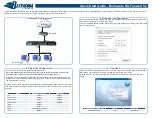
B-10
Cisco 7200 VXR Installation and Configuration Guide
OL-1520-05
Appendix B Configuration Register Information for the Cisco uBR10012 Universal Broadband Router
Configuration Bit Meanings
Bits 0–3
The lowest four bits of the processor configuration register (bits 3, 2, 1, and 0) form the boot field.
Table B-2
provides information about the bits settings.
The boot field specifies a number in binary. If you set the boot field value to 0, you must have a console
port access to boot the operating system manually. Boot the operating system by entering the
b
command
at the bootstrap prompt as follows:
> b [tftp] flash
filename
Definitions of the various command options follow:
b
—Boots the default system software from ROM
b flash
—Boots the first file in Flash memory
b
filename [host]
—Boots over the network using TFTP
b flash
filename
—Boots the file (
filename
) from Flash memory
If you set the boot field value to a value of 2 through F, and there is a valid system boot command stored
in the configuration file, the router boots the system software as directed by that value. (See
Table B-3
.)
If you set the boot field to any other bit pattern, the router uses the resulting number to form a default
boot filename for netbooting.
If there are no
boot
commands in the configuration file, the router attempts to boot the first file in system
Flash memory. If no file is found in system Flash memory, the router attempts to netboot a default file
with a name derived from the value of the boot field (for example, cisco2-7200). If the netboot attempt
fails, the boot helper image in boot flash memory will boot up.
If
boot
commands are in the configuration file, the router software processes each
boot
command in
sequence until the process is successful or the end of the list is reached. If the end of the list is reached
without a file being successfully booted, the router will retry the
netboot
commands up to six times if
bit 13 of the configuration register is set, otherwise it will load the operating system software available
08
0x0100
Break disabled
10
0x0400
IP broadcast with all zeros
11–12
0x800–0x1000
Console line speed
13
0x2000
Boots default ROM software if initial boot fails
14
0x4000
IP broadcasts do not have network numbers
15
0x8000
Enables diagnostic messages and ignores NVRAM contents
Table B-1
Configuration Register Bit Settings (continued)
Bit No.
Hex
Meaning
Table B-2
Bits 0–3 Settings
Boot Field
Meaning
0
Stays at the system bootstrap prompt (ROM monitor) on a reload or power cycle
1
Boots the boot helper image as a system image
2
Full boot process, which loads the Cisco IOS image into Flash memory
2-F
Specifies a default filename for booting over the network from a TFTP server















































